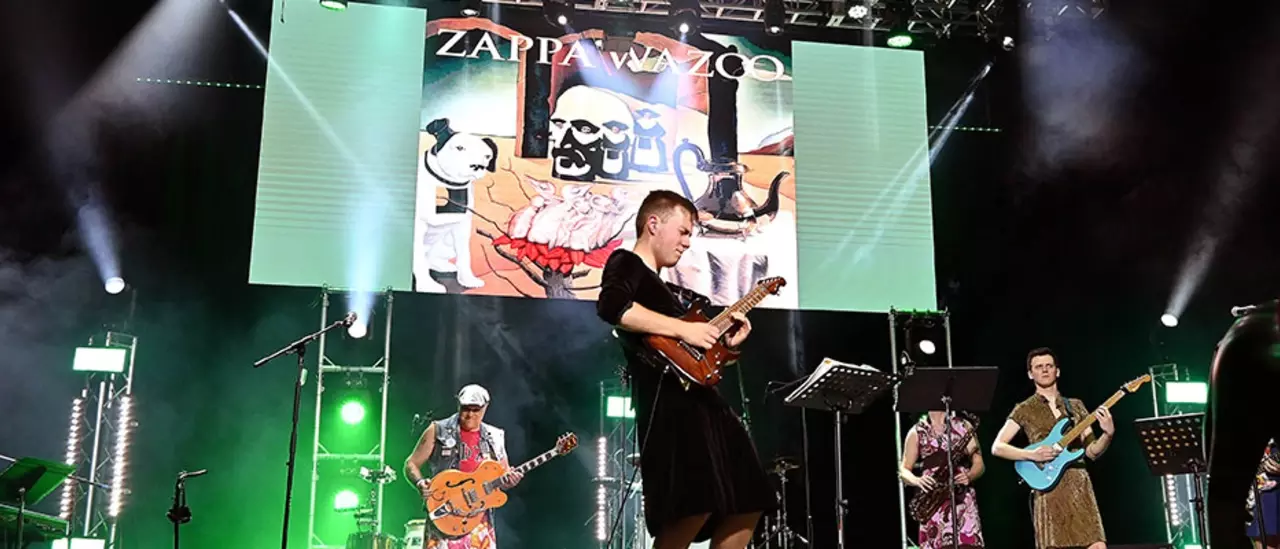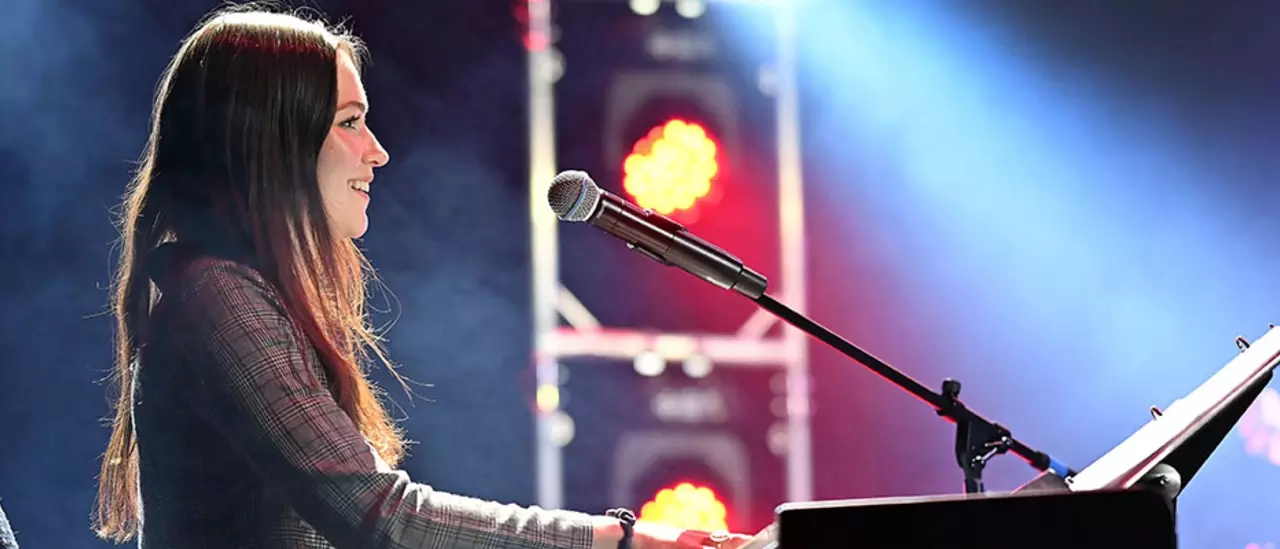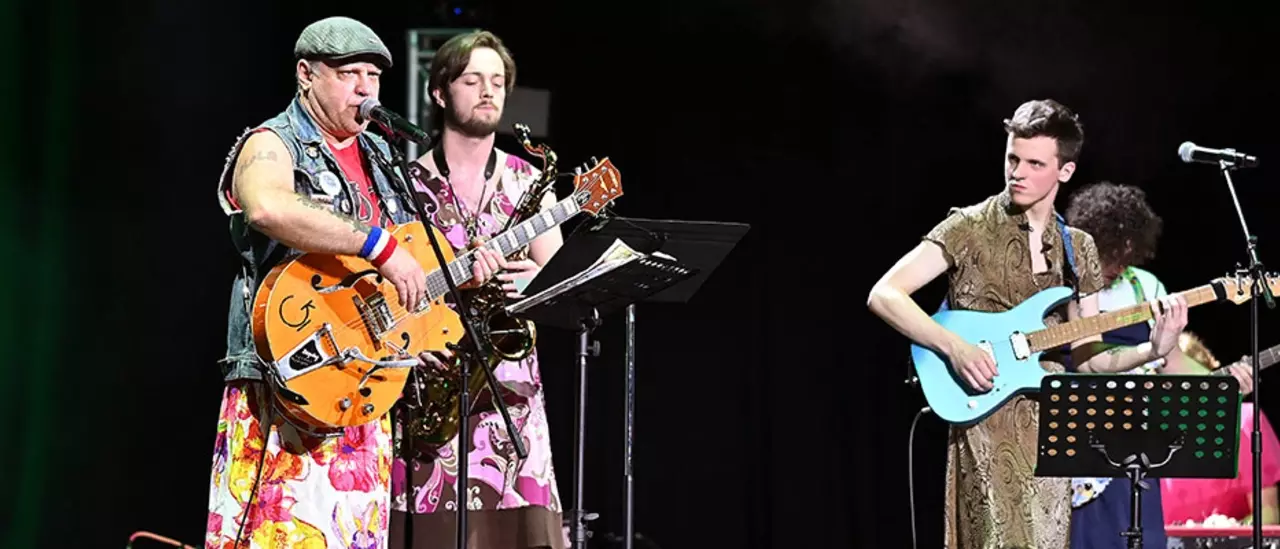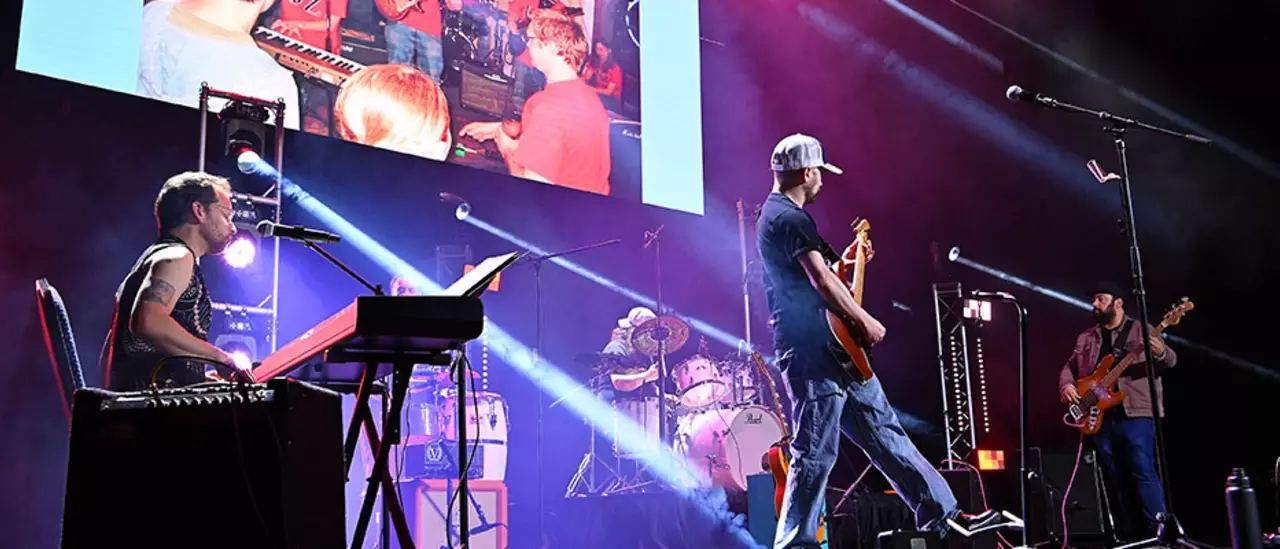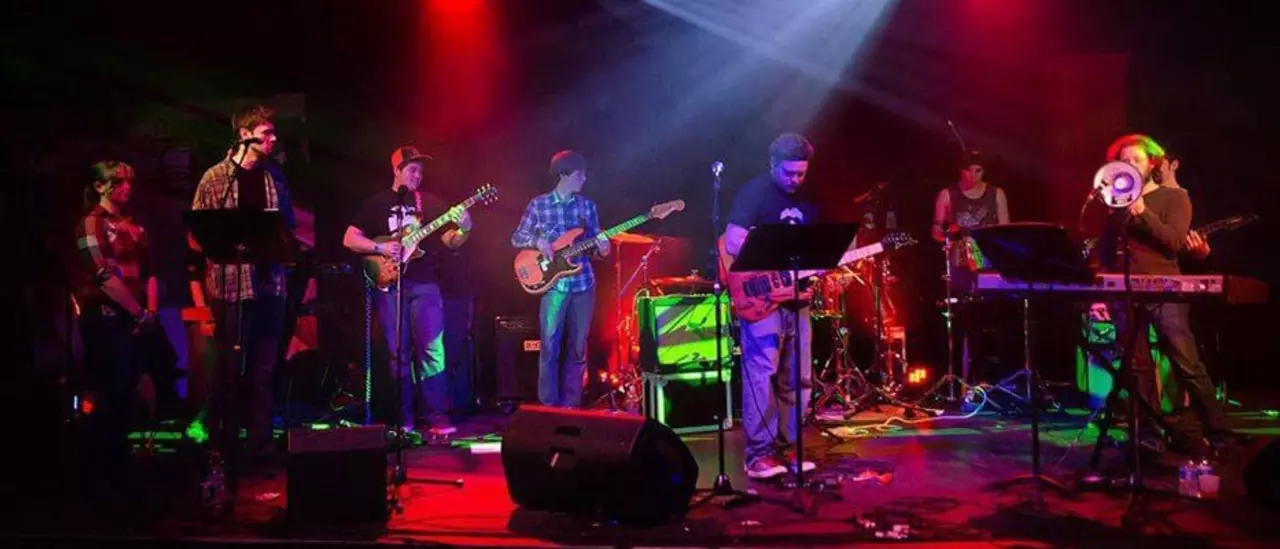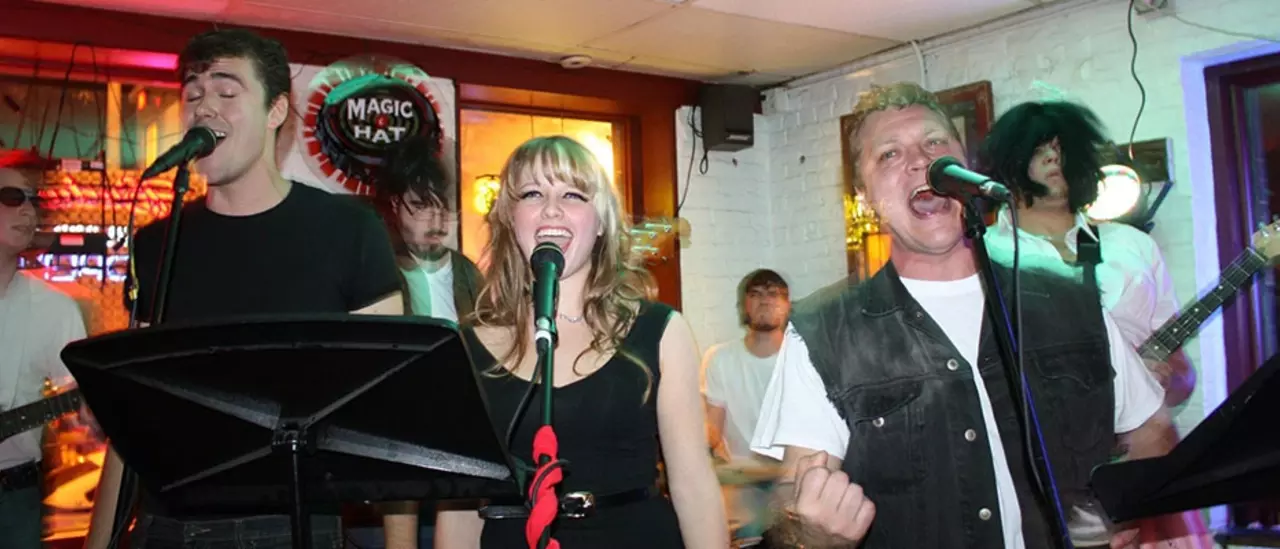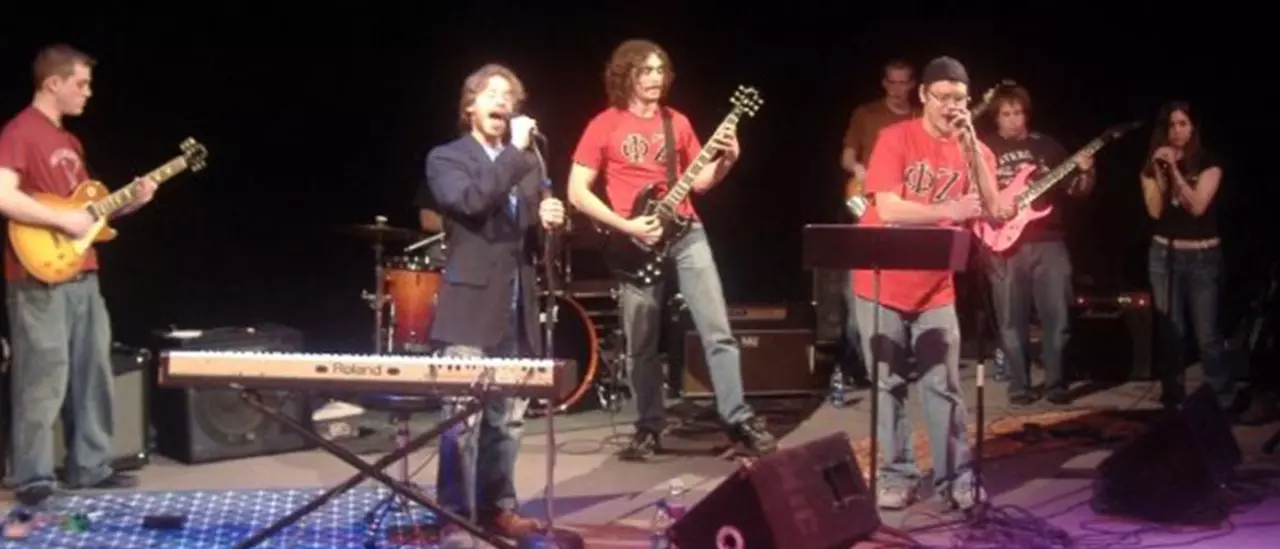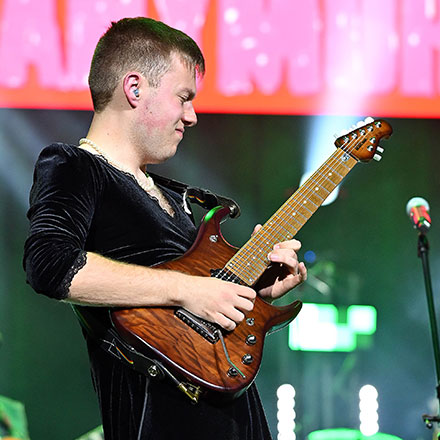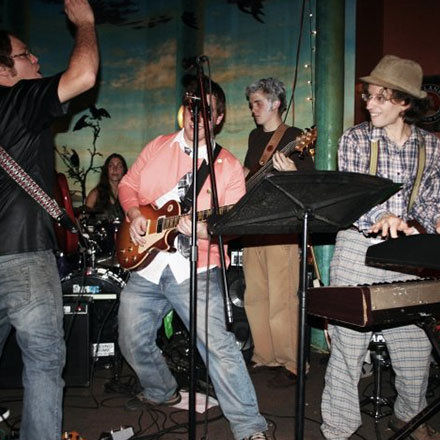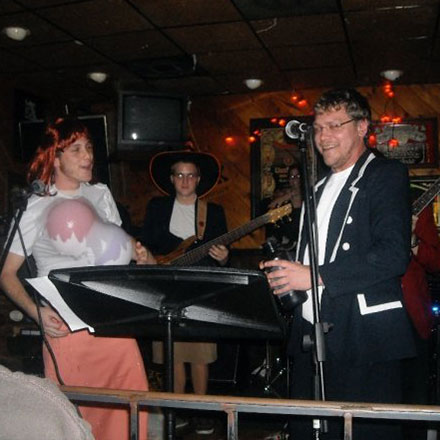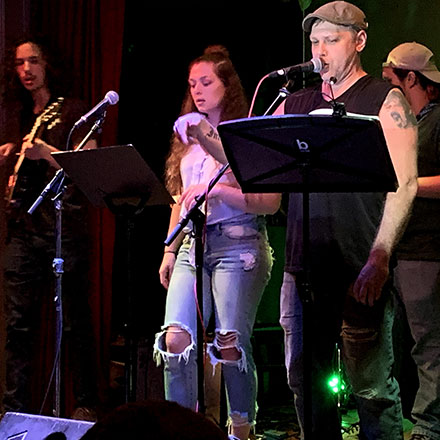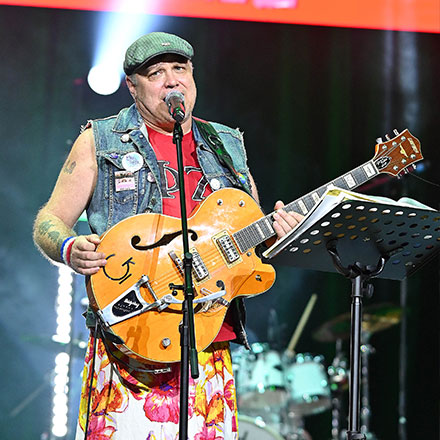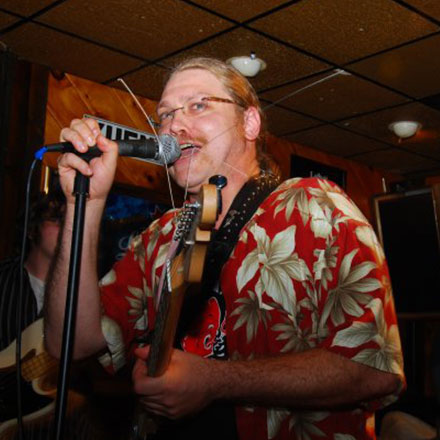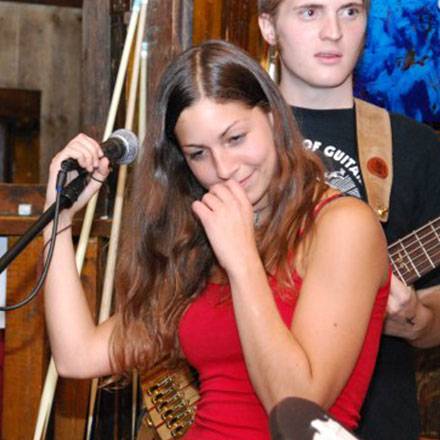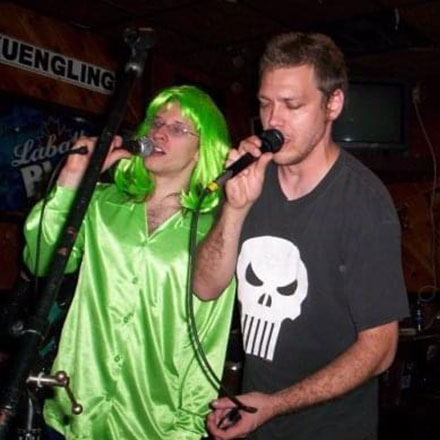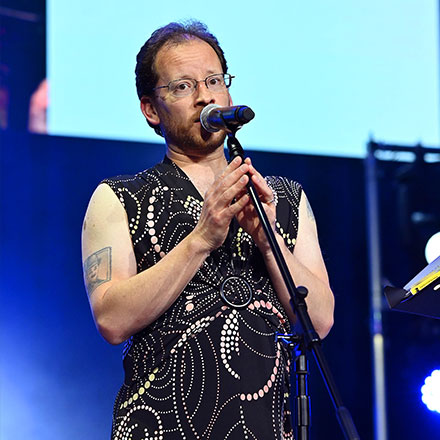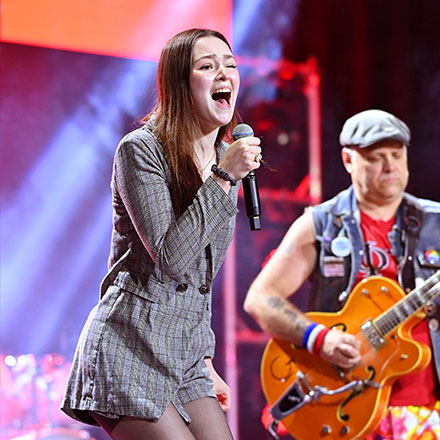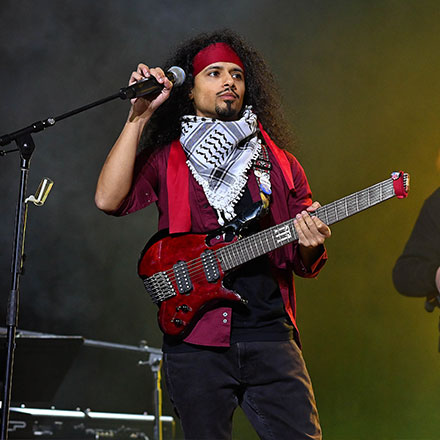After two decades of music, camaraderie and a dash of chaos, SUNY Oneonta has bid farewell to “The Mothers of Intention,” a Frank Zappa-inspired performance class that became one of the most popular, longest running music ensemble classes in the university’s history, challenging and inspiring more than 60 alumni musicians.
Thirty of these alumni returned to Oneonta this spring, joining current students, faculty and friends for a special “20th Anniversary and Farewell Show” at Foothills Performing Arts & Civic Center. Band members past and present performed to a packed house one last time, with a photo slideshow from the past 20 years playing behind them.
Tyler Tompkins, a senior Music Industry major who plays guitar and sings for the group, said he was “honored to be part of the final band after an incredible 20-year run.”
“I’ve been in the Zappa Band for two years now, and I can happily say it’s been the most fun and rewarding experience in my time at SUNY Oneonta,” Tompkins said. “Every week I get to play some of my favorite music with some of the most talented musicians I've ever met. The music is extremely complex, but everyone puts in the work every week, so we've been able to pull off some difficult pieces. Despite being a school ensemble, it really has felt like a real band, and it's one I'm going to miss dearly.”
“Mark’s Garage”
The ensemble was born in the fall of 2003 out of Adjunct Lecturer Mark Pawkett and Class of 2003 alumnus Darcy Gibson’s friendship and mutual love of Frank Zappa’s enormous musical catalog. Alongside their friend Jim Seymour and faculty members Rob Lipari and Paul Carter, the crew played a handful of shows together but quickly realized they didn’t have time to put into learning, dissecting, absorbing and practicing Zappa’s labor-intensive compositions.
But Pawkett and Gibson had an idea: Why not continue the band as a special topics ensemble class that could provide a rewarding real-world learning experience for student musicians?
The Mothers of Intention—a play on Zappa’s band, “The Mothers of Invention”—was offered as a class in the fall of 2005, with the group playing its first official show that Halloween at the Autumn Café. Zappa’s genre-defying, provocative music was always the key to its success.
“As an artist, you always want to feel challenged when you’re doing something, and you also want to have fun, and you want the audience to have fun,” Pawkett said. “Zappa music presented the perfect learning scenario because it’s complex and brilliant and, therefore, required a lot of hard work to master it. There’s a lot of improv, as well. In his songwriting, there was all this social commentary and satire and humor, too, and that requires a certain stage presence to be able to perform. Not to mention, the guy was one of the most prolific artists in history, so we had thousands of songs to choose from.”
“Over-Nite Sensation”
The group’s first lineup, consisting of Pawkett, Gibson and students Andy Boxer, Jason Roach, Matt Muro, Jonathan Romero and Chris Knowlton, “really set the bar high for the next 19 years.” In the next two decades, about 60 students would take the semester-long special topics class, which was highly sought-after, audition based and worth 3 credit hours.
Donning flamboyant costumes that referenced movies or pop culture, the ensemble frequently performed on campus and downtown, at The Black Oak, The B-Side Ballroom and the General Clinton Pub (“There was a sweet spot in the late 2000s where we’d have 200 people at a show, completely packed, and we’d play every Halloween and St. Patrick’s Day,” Pawkett recalled.)
“At that time, we had 700 music majors here, and we were in the middle of a real ‘player boom,’” Pawkett recalled. “The internet had blown up, and young musicians were watching YouTube, seeing other great musicians putting videos up and learning so much that way. We had some really strong bands in those early days, talented enough to learn entire Zappa albums.”
In total, the different iterations of The Mothers of Intention learned and performed about 400 Frank Zappa tracks and 14 full albums.
Unfortunately, when the COVID-19 pandemic forced classes online and canceled live events, the Zappa ensemble took a major hit. Even after the group was able to recommence, a rapidly changing social landscape and music industry meant it was time to rethink the band entirely.
“If you look at the top two genres on the U.S. music charts, it’s hip hop and R&B, which have such a rich history, dating back into the 40s,” Pawkett said. “We pride ourselves on being a top Music Industry school, and we have to keep up with the times. So, we’re transitioning to an R&B/hip-hop course, which I’m really, really excited about.”
The new ensemble will launch this fall and will have 10 spots for student musicians, including vocalists, DJs and rappers.
“Ahead of Their Time”
Students in the band didn’t just learn about music and performance, Pawkett said, but also about life.
“Zappa wrote nonstop and he didn’t care what other people thought,” he said. “I tell a lot of my students this: The best weight to lose is the weight of caring what other people think about you. If you can learn that in the classroom and go out in the real world and continue to learn and put that into practice, you’ll go far.”
Keyboardist Bobby Green, who graduated in 2015 with degrees in Music Industry and Philosophy and an Audio Arts Production minor, took this to heart. Green, a composer, songwriter and keyboardist who now lives in Nashville and works as an audio engineer, producer and adjunct instructor at SAE Institute, was elated to return and perform at the anniversary show alongside friends and “the incredible current lineup!”
“This band had a huge impact on all of us as musicians and as people,” said Green. “There are many ways in which the Zappa band helped prepare me for all the work I’m doing now. The most direct way is that it pushed me to greatly improve my skills as a keyboardist and performing musician, because this music is notorious for being some of the most challenging in the rock/popular music canon, and Mark demanded excellence from everyone. More broadly, the ensemble instilled in me a work ethic, commitment to quality, teamwork, and an ability to learn quickly, which has aided me in everything I do.”
For Gibson, who made the difficult decision to quit the band after COVID and starting a family, revisiting old photos and videos of The Mothers of Intention was bittersweet.
“For the first time, I began to see the legacy of the group, and the massive amount of really good musicians with whom I played in the various incarnations of the Mothers of Intention,” Gibson said. “Looking back at the footage and photos and listening to the recordings, I was struck by the fact that we were so frequently laughing and having fun. We also played pretty well most of the time! I put so much of myself into this group for nearly 20 years, and I am incredibly proud of the results of what Mark and I did together in the Mothers’ two-decade existence.”
